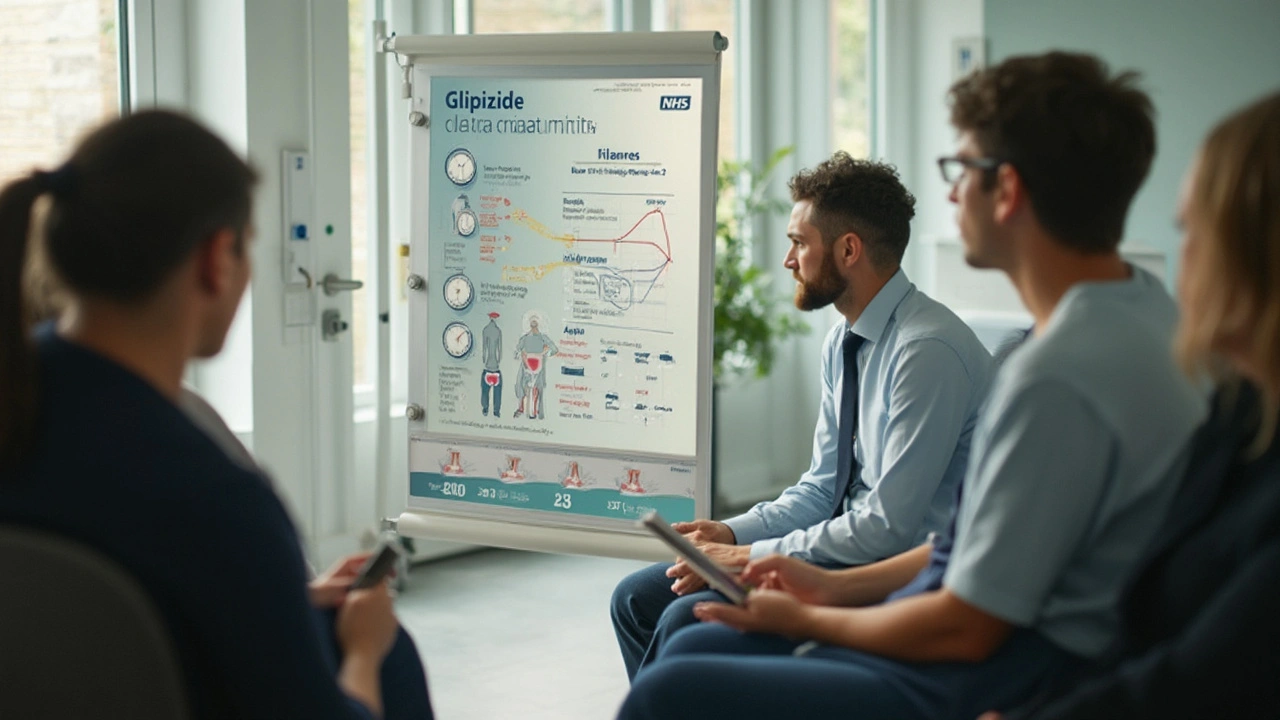GLP-1 Agonists and Glipizide: Why Weight Matters With Diabetes Medications
When you’re dealing with diabetes, you get pretty familiar with that classic balancing act: blood sugar versus everything else. Glipizide, part of the sulfonylurea class, has been a go-to for decades. It pushes your pancreas to crank out more insulin. Problem is, it tends to nudge the scale in the wrong direction. People on Glipizide can easily gain a few pounds—or more. And that’s not just frustrating, it can actually make diabetes harder to control.
Now, step into the picture: GLP-1 agonists like semaglutide and tirzepatide. Instead of forcing insulin out, these drugs mimic a gut hormone that helps you release just the right amount when you eat and tells your brain you’re full. GLP-1 agonists don’t just help lower blood sugar; they often trigger real weight loss. These medications aren’t just for diabetes—they exploded in use for obesity in the last couple of years, with names like Ozempic, Wegovy, and Mounjaro popping up everywhere. According to the New England Journal of Medicine, semaglutide users lost an average of nearly 15% of their body weight in 68 weeks. That's not a typo—people really dropped over 30 pounds, on average.
Weight gain matters because extra pounds can worsen insulin resistance and drive up blood pressure and cholesterol. Each extra inch around the belly isn’t just an annoyance; it’s a problem for your heart and your diabetes. That's why more and more people—and their doctors—are looking for diabetes meds that also support weight loss.
How Semaglutide and Tirzepatide Change the Game
Let’s get specific. Semaglutide (brand names Ozempic for diabetes, Wegovy for obesity) and tirzepatide (marketed as Mounjaro and Zepbound) have changed the way doctors think about type 2 diabetes. Both drugs are once-weekly injections. Here’s the cool part: besides lowering blood sugar, they flip the script by helping people eat less. Appetite drops, portion sizes shrink, and food starts to taste less rewarding. For semaglutide, clinical trials report average weight loss of about 12-15% of total body mass. Tirzepatide goes further, with up to 20% weight loss in some studies—and that’s the sort of outcome you'd typically see after bariatric surgery rather than pills or injections.
But numbers don’t tell the whole story. People who use these drugs often talk about how their food cravings just turn down, letting them finally break the cycle of yo-yo diets. Instead of fighting hunger all day, you feel satisfied with less. And there’s another bonus: less risk of low blood sugar (hypoglycemia) compared to sulfonylureas like Glipizide. That means fewer scary moments of dizziness or confusion, and way less stress about having to “rescue” yourself with carbs throughout the day.
Critics used to worry about the side effects: nausea, diarrhea, and sometimes vomiting—especially at the start. But these tend to fade over time, particularly if you increase your dose slowly. Far fewer people drop out of clinical studies from side effects than from the weight frustration that comes with older meds.
Here's a quick stat table highlighting weight impact across these medications:
| Medication | Average Weight Change | How It's Taken |
|---|---|---|
| Glipizide | +3 to +5 lb | Daily pill |
| Semaglutide | -12% to -15% | Weekly injection |
| Tirzepatide | -16% to -20% | Weekly injection |
It’s no wonder so many people are asking their doctors if they can swap out Glipizide for a GLP-1 instead.

The Downside of Glipizide: Why the Weight Gain?
So what makes Glipizide such a weight gainer? It pushes insulin up even when your blood sugar isn’t high. That means extra calories turn into fat, and you might find yourself snacking more to head off low blood sugar spells. If you ever felt ravenous after taking Glipizide, you’re not alone.
Another thing: while it’s cheap and widely covered by insurance, extra body weight from Glipizide doesn’t just stick around your belly. It packs on to your liver and muscles—places that already struggle with insulin resistance. Over time, this can inch your risk upward for heart and kidney issues. Plus, chasing down low blood sugars with snacks or juice just keeps the cycle going.
If you’re ready for a switch, it’s not just about stopping a medication; it’s about finding an option that fits your lifestyle and goals. Modern alternatives are out there—think SGLT2 inhibitors (like Jardiance and Farxiga), DPP-4 inhibitors (like Januvia), or the powerful weight and glucose benefits of GLP-1s.
If you’re ready to explore more, check out this weight-friendly Glipizide substitute list, which lays out the best choices available right now.
Switching off Glipizide can look different for everyone, depending on insurance, tolerability, and diabetes control. Always chat with your doctor before changing medications—you want a plan that keeps blood sugar tight without packing on pounds.
Real-World Tips and Surprising Facts: Making the Best Diabetes Med Choice
Ready for some practical moves? Start with your priorities: are you looking to lose weight, avoid annoying lows, keep things simple, or just save money? For many folks, if weight loss is top of the list, GLP-1 agonists make sense, even with their higher price tags. Some health plans are finally catching up, covering these newer drugs for people with either diabetes or obesity.
Stick with it: the first 2-4 weeks on semaglutide or tirzepatide can feel rough, so start slow. Take doses with food, stay hydrated, and skip greasy stuff for the first month. If you get queasy, ginger chews and plain crackers help. Most nausea fades as your body adapts. Bring up any side effects with your doctor before stopping the medication—there’s usually a solution.
Did you know you don’t have to check your blood sugar as often on a GLP-1 alone versus sulfonylureas? Less finger poking, fewer swings. Plus, the average person on semaglutide in real-world online forums reports buying new clothes after 6-8 months, thanks to the weight that finally moves in the right direction.
For folks with stubborn insulin resistance—or anyone with a family history of heart disease—GLP-1 agonists also show heart benefits that Glipizide just can’t match. Large studies found fewer heart attacks, fewer strokes, and even better kidney health over time on these meds.
The bottom line: your medication can work for you—not against you. If Glipizide is dragging you down, talk to your provider about other meds that manage your sugars and your waistline. It’s your life; you don’t have to settle for side effects that make you miserable.


Write a comment